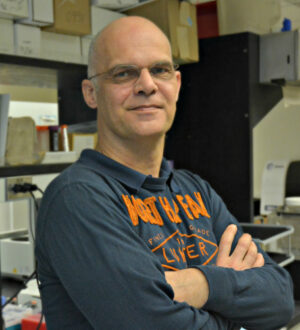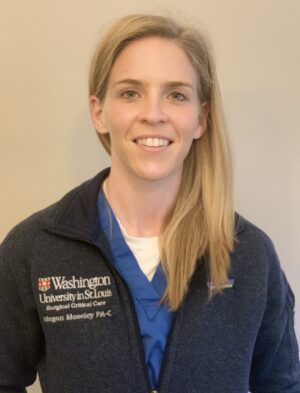The Division of Nephrology’s 2022 Translational Innovation grant of $50,000 has been awarded to Andreas Herrlich, MD, PhD, Associate Professor of Medicine, and Charbel Khoury, MD, Assistant Professor of Medicine, and Megan Moseley, Physician Assistant in Critical Care, for their project “Circulating Osteopontin in AKI and its role in COVID-19 associated-ARDS.”
The WashU Nephrology’s Translational Grant program, now in its seventh year, brings together a basic scientist and clinician from within our Division to pursue a collaborative project with translational potential.

The currently funded project focuses on infection with SARS-CoV-2 (COVID-19), which frequently results in acute lung injury (ALI) or its severe form, acute respiratory distress syndrome (ARDS), which is associated with high mortality. In critically ill COVID patients with ALI/ARDS, 50% develop acute kidney injury (AKI), which increases their mortality to about 60-80%.
“We recently identified circulating osteopontin (OPN) released from the injured kidney after ischemic AKI as a key mediator of lung endothelial leakage, lung inflammation and respiratory failure in mice,” says Dr. Herrlich, who is the Director of Translational Research in our Division. His group subsequently found that OPN is elevated in serum samples of patients with AKI and correlates with the degree of kidney injury, thus strengthening the link between elevated OPN serum levels and kidney injury in humans (manuscript currently in press in Science Advances, release date February 25, 2022).
The current study will be a prospective observational cohort study of COVID ARDS patients.

“We hypothesize that in ARDS, patients with AKI will have higher OPN serum levels compared to patients with no kidney injury, and that OPN serum levels will correlate with severity of AKI,” says Dr. Khoury, who was also awarded the Translational Innovation grant in 2019. “Secondly, we hypothesize that higher OPN serum levels will be associated with an increased need for mechanical ventilation and worsened respiratory failure.”
Acute kidney injury-induced remote lung injury is under recognized in the clinic due to confounding factors such as volume overload and uremia, leading to an underestimation of the inflammatory component added to lung injury by concurrent AKI.
“However,” says Herrlich, “it is clinically accepted that ALI/ARDS, such as from COVID-19 lung infection, is very much negatively impacted by the development of AKI, with resultant high mortality. Our work has the potential to identify osteopontin as a new drug target in humans that could ameliorate the detrimental effect that AKI has on the injured lung.”

Also involved in the project is Megan Moseley, PA in Critical Care, Division of Anesthesiology, who, having worked in the COVID ICUs during the entire pandemic, brought her clinical perspective to the design of the study.
“The mortality of critically ill COVID-19 patients with ALI or ARDS is markedly high, and while AKI is very common in these patients,” says Moseley. “Circulating OPN could be a great tool to recognize which patients may have increased requirements for mechanical ventilation and overall increased mortality. The COVID-19 ICU patient population presents a unique cohort of patients in which OPN serum levels can be monitored which could potentially help in their clinical management.”
The pilot study will provide data for a larger trial and RO1 application examining the association between primary lung injury, kidney failure, OPN serum levels and respiratory outcomes in critically ill patients in greater detail. It will also provide an additional rationale for targeting OPN in AKI-ALI or ALI/ARDS associated with AKI.
Please visit the Herrlich Lab website and follow @HerrlichLab, @Charbel_Khoury, @mosemegb and @WUNephrology on Twitter.
Follow these links to read about previous recipients of our Translational Innovation Grants:
- 2020 Translational Innovation Grant Awarded to Drs. Sanjay Jain and Tingting Li
- Drs. Kefalogianni and Khoury Awarded 2019 Translational Innovation Grant
- Suleiman and Alhamad Awarded WU Nephrology 2017 Translational Innovation Grant
- Goldberg and Mahjoub Awarded Nephrology Translational Innovation Grant
- Translational Innovation Grant Winner Announced